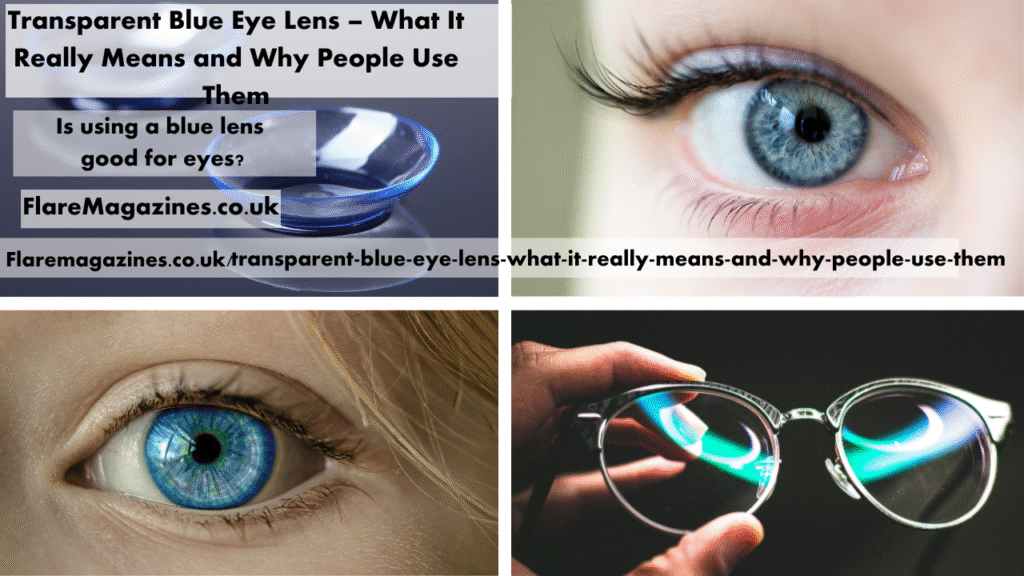Sometimes I get confused with the term transparent blue eye lens myself. Like, is it the cosmetic kind that makes your eyes look different, or the protective kind with blue light filters for screen time? Funny thing is, both are correct in different contexts. And honestly, people mix them up all the time.
I’ll admit, the first time I heard someone say they were wearing a transparent blue eye lens, I imagined a kind of icy-glass look, like Elsa’s eyes from Frozen. Turns out… nope. It’s either a cosmetic contact lens or a clear lens that secretly blocks blue light from your laptop or phone. Let me break down both so you can actually figure out which one you’re interested in.
Cosmetic Transparent Blue Eye Lens – Style Over Everything
If you’ve ever looked in the mirror and wished your brown eyes were a lighter shade, you’re not alone. A transparent blue eye lens in the cosmetic sense is really just an enhancement-tinted contact lens. They don’t make you look like an alien (unless you go for those dramatic cosplay ones, which honestly can be pretty fun at Halloween).
- How they work: The lenses are translucent, which means if you already have light-colored eyes, they’ll just pop more. Blue eyes become a deeper, more striking shade. But if your eyes are naturally dark brown? Yeah, you probably won’t notice much unless you go for opaque lenses instead.
- Pros: They’re fashionable, they can completely change your vibe, and you can get them with or without prescription. Imagine pairing them with something fancy from the GUCCI® US Official Site | Redefining Luxury Fashion – the effect is pretty dramatic.
- Cons: Pricey compared to standard contacts, and if you’re new, it takes a while to find a shade that doesn’t look fake. Oh, and eye irritation is a real risk if you don’t keep them clean.
I once tried enhancement lenses at a friend’s wedding. Honestly, I kept forgetting I had them in, but when I saw photos later, my eyes looked sharper. It was subtle though.
For Dark Eyes – The Opaque Version
Quick reality check: if you have deep brown eyes like most of us do, a transparent blue eye lens won’t really do the job. You’ll need opaque blue lenses that actually mask your natural iris. Those can completely transform your look – but you have to commit.
Think about it: do you really want people asking, “Wait, weren’t your eyes dark last week?” It can be cool for parties, but for everyday, some folks find it a bit too noticeable.
Transparent Lenses with a Blue Light Filter
Now, switching gears. When people talk about transparent blue eye lens in the tech/work sense, they’re usually talking about something else entirely – lenses that cut out harmful blue light. These don’t actually look blue, they’re clear but filter the wavelengths your screen throws at you.
- How they work: They reduce strain caused by phones, laptops, or gaming. If you’ve ever had those headaches after binge-watching a Netflix series at 2 a.m., you get why they matter.
- Who should use them: Students, gamers, remote workers, or honestly anyone who spends hours scrolling TikTok.
- Pros: Less eye strain, more comfort, sometimes even better sleep because you’re not wrecking your circadian rhythm.
- Cons: Not as strong as fully tinted blue-light glasses, but they’re good enough for daily use.
Do you ever wonder if half our modern problems—like feeling tired all the time—are just from screens blasting blue light into our eyes? I think about it way too often.
Safety Matters (Seriously, Don’t Skip This)
No matter which type of transparent blue eye lens you’re into, don’t skip the eye doctor part. It’s tempting to order cheap pairs online (I know, I’ve been there), but lenses are still medical devices.
- They need the right fit for your eye shape.
- You need a prescription, even if you only want them for fashion.
- And hygiene isn’t optional. Bad care = infections, and trust me, that’s not fun.
It’s like buying sneakers from a luxury store versus a random street vendor. Sure, both look okay at first, but only one won’t leave you with blisters. Kind of the same idea here.
Wrapping It Up
The phrase transparent blue eye lens is weirdly flexible. It could mean soft, stylish cosmetic lenses that change the way people see you… or protective lenses that keep you from getting fried by screens. Both have their place, and both can be worth it depending on your lifestyle.
Would I wear cosmetic ones every day? Probably not. But would I use blue light filters daily? Absolutely, yes. The trick is knowing which one you actually need before you hit “add to cart.”
FAQs
Is using a blue lens good for eyes?
Yes, but it depends on the type. Blue light filter lenses can be great for reducing eye strain from screens. Cosmetic blue lenses are fine too, as long as they’re fitted by an eye doctor and cleaned properly.
What is the transparent lens in the eye?
That’s your natural crystalline lens. It’s clear and sits behind the iris, helping focus light onto your retina so you can see sharp images.
Which eye lens color is best?
It really comes down to personal style and your natural eye shade. Blue lenses pop on light eyes, hazel or green look subtle on brown eyes, and grey often gives a mysterious, everyday-wear vibe.
Are blue eye contacts safe?
Yes, totally safe if you get them with a proper prescription and follow hygiene rules. The problems usually come when people buy cheap, non-medical ones online.
What are the side effects of blue lenses?
If misused, they can cause dryness, irritation, or even infections. Sometimes people also feel slight vision blur if the lens design doesn’t align perfectly with their iris.

